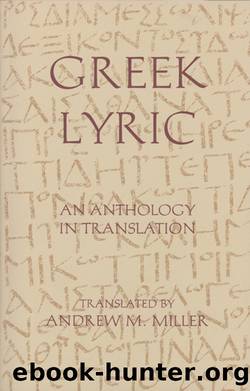Greek Lyric by Andrew M. Miller

Author:Andrew M. Miller [Miller, Andrew M.]
Language: eng
Format: epub
ISBN: 978-1-62466-397-0
Publisher: Hackett Publishing Company, Inc.
Published: 1996-11-15T00:00:00+00:00
Xenophonâs family, the Oligaithidai, were phenomenally successful in athletic competition, amassing numerous victories not only in all four of the major Panhellenic contests but also in a wide range of local games. The double victory at Olympia that provided the occasion for this ode (won by Xenophon in 464) was in itself an unprecedented achievement. In addition, Xenophonâs hometown of Corinth was one of the most prosperous and powerful Greek city-states, with an illustrious legendary past. In order to deal with this abundance of poetic material, Pindar methodically shifts the focus of his attention back and forth between Xenophonâs family and its achievements (1â3, 24â46, 93â115) and the many claims to fame of Corinth as a whole (4â23, 47â92). The story that he chooses to tell about one particular Corinthian hero, Bellerophon, is probably intended to have exemplary force: if manâs vaulting aspirations and ambitions (represented by Pegasos) can be mastered and kept under tight control through the exercise of moderation or âdue measureâ (represented by the golden bridle) and then directed toward the proper objects, remarkable exploits become possibleâas is evidenced not only by Bellerophon himself but by Xenophon and the Oligaithidai as well.
6â7 Good Order, Justice, Peace the three Horai (cf. 17); see Glossary.
14 descendants of Aletes the people of Corinth, of which Aletes, a descendant of Herakles, was a legendary king.
18â22 Pindar here attributes three inventions to the Corinthians: the dithyramb (a kind of choral song dedicated to Dionysos); the bit and bridle; and the temple pediment, whose name in Greek (aetoma, from aetos âeagleâ) derives from its resemblance in shape to a pair of outstretched wings. The reference to the bit and bridle as an embodiment of âdue measureâ (metron in Greek) invites the paradigmatic interpretation of Bellerophonâs taming of Pegasos (63â92) sketched in the introductory note.
29 from Pisaâs plains i.e., from Olympia (see Glossary).
30 The stade race (stadion) was the length of the standard stadium (approximately two hundred meters), hence its name. On the pentathlon see note on Xenophanes 2. 2.
35â36 beside the streams of Alpheos i.e., at Olympia (see Glossary).
38 in rocky Athens i.e., at the festival known as the Great Panathenaia.
40 Hellotia an athletic festival held in Corinth, dedicated to Athena Hellotis. Poseidonâs games established between two seas the Isthmian games, held on the Isthmus of Corinth, between the Corinthian and Saronic gulfs.
41â42 Ptoiodoros, Terpsias, Eritimos members of Xenophonâs family. Ptoiodoros was apparently the father of Thessalos; precisely how the other two were related to Xenophon is not known.
44 the pastures of the lion Nemea (see Glossary).
47â48 To justify discontinuing the catalogue of the familyâs athletic triumphs the poet invokes the principle of âdue measureâ (metron) already alluded to in line 20. To carry on with praise at the present moment would be to fall into reprehensible excessâparticularly since the poet has a responsibility not just to Xenophon and his family but to the Corinthian community at large (cf. sailing as a private citizen on a public mission, 49).
52 Sisyphos See Glossary, and cf.
Download
This site does not store any files on its server. We only index and link to content provided by other sites. Please contact the content providers to delete copyright contents if any and email us, we'll remove relevant links or contents immediately.
The Universe of Us by Lang Leav(15068)
The Sun and Her Flowers by Rupi Kaur(14511)
Adultolescence by Gabbie Hanna(8923)
Whiskey Words & a Shovel II by r.h. Sin(8009)
Love Her Wild by Atticus(7753)
Smoke & Mirrors by Michael Faudet(6184)
Wiseguy by Nicholas Pileggi(5771)
The Princess Saves Herself in This One by Amanda Lovelace(4973)
Love & Misadventure by Lang Leav(4843)
Memories by Lang Leav(4795)
Milk and Honey by Rupi Kaur(4743)
Bluets by Maggie Nelson(4548)
Too Much and Not the Mood by Durga Chew-Bose(4338)
Pillow Thoughts by Courtney Peppernell(4272)
Good morning to Goodnight by Eleni Kaur(4232)
The Poetry of Pablo Neruda by Pablo Neruda(4098)
Algedonic by r.h. Sin(4056)
HER II by Pierre Alex Jeanty(3606)
Stuff I've Been Feeling Lately by Alicia Cook(3449)
